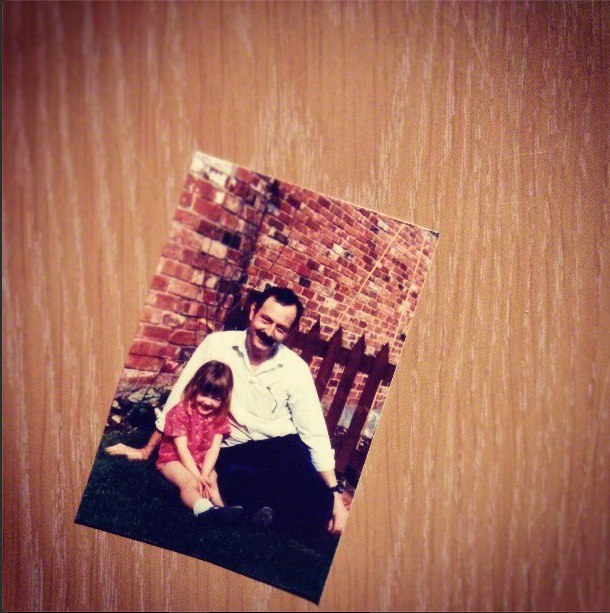
I’ve been trying to write this blog post for a long time. 3 weeks or so. OK, so not AGES, but a while. A bit. It has a title: “A Conversation With My Father: final, Bradford week”. But I’m not really sure what to write. Because unlike all the other things that I write about – on my blog, or for zines and reviews, my PhD and academic papers, I’m not looking at this from the outside. I’m in it. Properly buried deep inside it, and it, in turn, in me. I think of two images when I write that. I think about a song that used to play off a tape my mum kept in the car. Dusty Springfield. And her grainy sounding voice with the crunch of tyres on gravel.
“Like a circle in a spiral
Like a wheel within a wheel
Never ending or beginning
On an ever spinning reel”
That stationary smell of the inside of the black car with the grey patterned seats on a hot day. The song my dad used to sing every time we came back from a long drive, from Scarborough, Whitby, Wales on holiday.
“Here we are again
Happy as can be.”
And I think of that Ren and Stimpy* gross-out kids cartoon, that was on in the 90s, on Nickelodeon. Satellite TV! Imagine that. And this one episode (I can’t find a still from it you’ll be glad to hear) where Stimpy turns himself inside out. I think of that, too. I think of how I felt standing in front of gently house-lit friends, family, and strangers at the end of the Bradford week and telling them this story. I think of the bits of the show, the quiet bits that stay behind my eyes – that Alex, my collaborator, that he knows, but probably, he’s the only one. Some of the things I’ve seen, and the things I feel, most of them I tell you… and to stand there and tell you what I do, what I’ve done, in situations where I’m scared, cold, angry, frightened, or about the rationalisations I draw out of myself, that allow me to step back out of danger, to walk away from the symbol I’ve tried to be. That’s what it feels like when I tell you about those memories. Inside out. Raw. In the same way when I sit across the table and look at the empty chair where my dad was when I did the interview, empty, now, though, in the theatre. And I describe him to you. As he appears to me simultaneously across 28 years. A shimmering reality of a person.
I set out to make a piece of theatre about the space between them and us. In order to do that, I stand in that inbetween, set-aside space of the theatre and tell you about Hannah and Roger Nicklin. One of us a policeman, the other a protestor. Both of us more than that. Me and my dad. I’m proud of us both. I’m scared of when we might let ourselves down.
In Sheffield, at the very end of the third week, we did a MAJOR rewrite. Except it wasn’t major. It felt major, until it lay there in front of us, and then suddenly that was it. The story. Muddled, woven, difficult and true. Exactly in the same way life is. Rachel from Third Angel saw the uncut show on the Wednesday of that week and had said ‘you need to decide whether this is political, or it’s personal, which is the thing that matters most’.
It’s personal. It has to be. Through that it will – of course – be political, and the subject area, inevitably so. But the show Alex and I made; with the very great help of my dad, with the generous support of 4 theatres in the North and Middle of England; the show Alex and I made together is one only I can tell. It’s a true story. I can prove it, if you’ll consent to listen to me.
Also, I totally wrote an hour long show, learnt it all, and then remembered it in front of an audience.
I hope you’d be proud.
Here’s two things audience members said:
“Totally beautiful, affecting evening: A Conversation with my Father by the inestimable @hannahnicklin #Recommended in the strongest terms” – @discoverbrevity
“’A Conversation with my Father’ by @hannahnicklin – a terrific thing. The personal and political blend with charm and incisive thinking, win” @ADatMill
It’s going to be in Edinburgh from the 14th–24th of August. 8.05pm start. I’d love it if you could come. Venue announcement coming soon, and of course, I’ll definitely bring it to The Cookie in Leicester on the way up to preview, maybe somewhere in London and Leeds if I can too. Stay tuned.
In the meantime, forgive me for some thank yous: Thank you, Alex. Thank you Third Angel. Thank you to Arts Council England, ARC Stockton, and Theatre in the Mill. Thank you to Embrace Arts, Leicester, and to Sheffield Theatres. Thanks Lawrence for filming it, Lee for making some proper good (forthcoming) print work for it. And thanks, Daddy, for all that you are, and all you helped give me.
The end of week four. C’est tout.
*that was a weird show. You know what was weirder? Googling it just now and discovering the slashfic.


